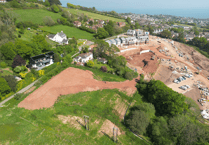A LARGER and more accurate dredger is being brought in to improve the main navigation channels into Teignmouth.
The estuary area suffers from shifting sands, and with larger cargo ships now coming into service, it is vital the entrance is kept deep enough.
The Harbour commission decided to invest some of its reserves to undertake a more accurate dredge of the channel from the bar to the quays in order to accommodate ships of 5.5 metre draught on a four-metre tide, said the outgoing chairman, Jeremy Grammer, in his annual report.
‘This will provide sufficient water for larger vessels, but also provide a wider window either side of high water springs for deeper draught ships to use Teignmouth.
‘UK Dredging have been retained to manage this project and in preparation, full surveys have been completed as an input to the planned dredge. Dredging contractors have been approached and the commission is waiting for a suitable dredger to become available.
‘In the meantime the channel depth has been increased to new levels and maintained by the combined effort of the grab dredger Mannin and the Teign C. Much help and assistance has been provided by Associated British Ports in this endeavour and they continue to invest in the port infrastructure with modern handling equipment and storage facilities to ensure rapid ship turnarounds and operational efficiency.’
Conservancy subsidies
Mr Grammer stressed that pressure continued to be applied on the Ministry of Defence, the Prime Minister’s office and other bodies, concerning the issue of conservancy subsidies enjoyed by Plymouth commercial ports.
This was giving Plymouth competitive advantage to the detriment of Teignmouth, and was contrary to the government’s National Ports Policy.
The reported trading profit of £32.9k included revenues of £46.5k generated from a surcharge on commercial ship dues that had been remitted to the Pilots National Pension Fund (PNPF) as part of the £l.lm deficit recovery plan which the commission is required to undertake in the coming years.
The underlying loss of £13.6k reflected tonnage throughput of the port remaining at a similar level to the previous year with some additional costs including the updating of the commission’s IT system, and the detailed survey work in preparation for the planned channel dredge.
Leisure business
There was also a reduction of income generated by visiting yachts, due to the poor summer weather. But the leisure business performed well, with a much improved level of services although there was limited potential for increasing the number of moorings due to lack of space and water tonnages held up well at 386k tonnes, compared with 382k tonnes in 2014, with the main commodities being animal feed, fertilizer, slag and feldspar on imports, and ball clay on exports.
New cargoes
New cargoes continued to be actively sought. Devon County Council had been approached on the procurement of road salt, where the main depot is in Newton Abbot.
This was presently imported from Northern Ireland by ship into Plymouth.
‘By using Teignmouth with its excellent handling facilities for this trade, local businesses and jobs will be boosted alongside a lower carbon footprint,’ said the report.
Professional services
Dock and harbourmaster and consultancy services had been provided to Associated British Ports (ABP) of Teignmouth and ABP Millbay, as well as marine advisor services to Exeter City Council covering the Exeter canal and the River Exe. These professional services continued to make a positive contribution to the revenue stream.
‘There is an excellent working relationship between the commission and ABP, with the common aim to be competitive and improve services to customers as well as future proofing the operation of the port with the ability to handle the deeper draught new build of short sea ships.’
Mooring improvements
Mooring numbers remained constant with a long waiting list for deepwater moorings.
Harbour staff provided more support to mooring holders in the laying of new non-maintained moorings and the replacement of worn risers, chains and ropes. This significantly reduced the number of vessels breaking loose through mooring failures.
.
raised profile
The commission maintained its high level of communication with its customers, suppliers and stakeholders through the consultative body, the Dock User Group, the Teign Estuary Partnership, the Teign Estuary Forum, and with local authorities and through various meetings.
The commission was now recognised on a regional and national scale as one of the UK’s leading smaller ports.
Chief executive officer and harbourmaster Cmdr David Vaughan had been instrumental in raising the profile of Teignmouth.
He was appointed president of the UK Harbour Masters Association, was chairman of South West Regional Ports’ Association, chairman of the Teign Estuary Partnership, and an active British Ports Association regional ports committee member.
Mr Grammer said Newton Abbot MP Anne Marie Morris had done much at government level to promote Teignmouth as a leading regional port, and had arranged a visit to the commission and the port by Patrick McLaughlin, Secretary of State for Transport.
‘There is a heavy emphasis to win new business for the port with a greater tonnage throughput and several opportunities are being pursued.
‘This is critical for the commission to generate better than breakeven results. Also there is growing pressure and expectation from the shippers for the port to handle the larger vessels with their greater carrying capacity,’ he said.
Challenges ahead
Mr Grammer concluded that during his tenure as chairman, there has been a major transition and many changes in the way the commission operated.
‘An accountable management structure with tight financial controls, disciplined business processes and governance have been implemented. Efficiencies have been gained through the embracing of the latest technologies.
‘There has been a massive improvement in communication with customers and stakeholders, and the way the commission discharges its responsibilities.
‘It has developed an excellent team which manages the day to day business of the harbour, who are supported by a first class set of commissioners.
‘As a result the commission is now a highly professional organisation recognised at local, regional and national level.’
There were many challenges ahead and the new chairman, Graham Bond, with his extensive knowledge and experience, was well equipped to take the commission forward.
Mr Grammer was grateful for the support and guidance from all the commissioners past and present, and the harbour team during his chairmanship.
He also praised the pilots who operated in all weathers and all hours throughout the year, navigating ships in and out of the harbour with skill and professionalism, a vital role in the operation of the port.





Comments
This article has no comments yet. Be the first to leave a comment.